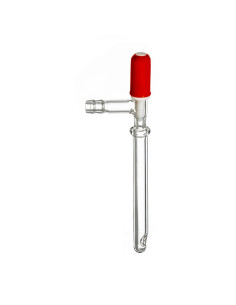VACUUM VALVES FOR DESICCATORS
Vacuum Valves for Desiccators
In laboratory work, the ability to precisely control environmental conditions is essential for the integrity of your samples and the validity of your results. If you use a desiccator to protect moisture-sensitive materials or to perform vacuum drying processes, you’ll understand the importance of every component. This is where vacuum valves for desiccators become indispensable—acting as the control center that enables you to manipulate and maintain the desired atmosphere with pinpoint accuracy.
A vacuum valve is a specialized stopcock or tap integrated into vacuum-compatible desiccators, allowing connection to an external vacuum pump. Its primary function is twofold: it enables the evacuation of air from within the desiccator to create a reduced-pressure (vacuum) environment, and it also allows for maintaining that vacuum hermetically or introducing an inert gas in a controlled manner. Without a quality vacuum valve, the performance of your vacuum desiccator would be severely compromised, affecting both efficiency and operational safety.
Investing in a reliable vacuum valve ensures optimal desiccator performance and the protection of your valuable samples.
Essential Component for Reliable Vacuum
The reliability of any laboratory vacuum system depends largely on the integrity of each connection—and vacuum valves for desiccators are critical links in this chain. Their design enables an airtight seal that prevents leaks, which is crucial for maintaining a stable vacuum over extended periods or for avoiding the intrusion of moisture or atmospheric contaminants. Even the smallest leak can ruin a sensitive experiment or compromise the preservation of hygroscopic materials.
These valves are typically made from high-resistance materials such as ground borosilicate glass with plugs or engineered polymers with Viton or PTFE O-rings. The material choice depends on the required chemical resistance and mechanical durability. Their mechanism offers precise control over gas flow, allowing you to release vacuum gradually and in a controlled manner—avoiding turbulence that could affect delicate samples.
The ability to create and maintain vacuum or a controlled atmosphere through these valves is critical for applications such as low-temperature precipitate drying, preserving calibration standards that must not oxidize, or handling highly reactive substances.
Types and Functionality in the Laboratory
Vacuum valves for desiccators come in various configurations to fit different desiccator models and operational needs. While their core function remains the same, the variations offer distinct advantages:
-
Ground Glass Valves: These classic valves provide excellent chemical resistance and a very effective seal when used with appropriate vacuum grease. They are commonly found in glass desiccators and offer clear visibility of the channel. Regular maintenance of the grease is required to ensure tightness.
-
Plastic Valves (Polypropylene, PTFE, etc.) with O-Rings: These alternatives provide greater impact resistance and eliminate the need for vacuum grease, simplifying maintenance and reducing the risk of grease contamination. They are common in plastic desiccators and offer robust, long-lasting sealing performance.
Regardless of type, the primary functions of these valves are:
-
Connection: Enable the connection of the desiccator to a vacuum pump via tubing.
-
Evacuation: When opened, they allow air to be extracted to create vacuum.
-
Maintenance: Once closed, the vacuum is retained thanks to an airtight seal.
-
Ventilation / Gas Introduction: Allow for the controlled release of vacuum or introduction of an inert gas, such as nitrogen, to create a protective atmosphere.
Valve placement (on the side or in the lid) may vary, but the purpose remains the same: to give you full control over the internal atmosphere of your desiccator.
The Choice That Safeguards Your Results
When choosing vacuum valves for your desiccators, it’s vital to consider compatibility with your specific desiccator model and the type of work you perform. The valve’s material resistance to the chemicals you handle and its ease of maintenance are key factors. A high-quality valve not only gives you precise vacuum control but also the peace of mind that your samples are secure and your results won’t be compromised by an unexpected vacuum loss.
At Pobel, we know that every detail in the lab matters. That’s why we offer a range of high-quality vacuum valves for desiccators, crafted from durable materials and designed for optimal control. Our commitment is to provide you with reliable components that ensure maximum precision and safety in your drying and storage processes. Complete your setup with the right accessories, such as our desiccator plates, for a comprehensive and efficient system.
Trust Pobel’s expertise to equip your lab with the tools you need for exceptional results.
Looking for total control in your lab’s vacuum processes?
Contact us today to learn more about our vacuum valves for desiccators and how they can enhance the precision and safety of your work.
Pobel: your trusted partner in laboratory equipment.







